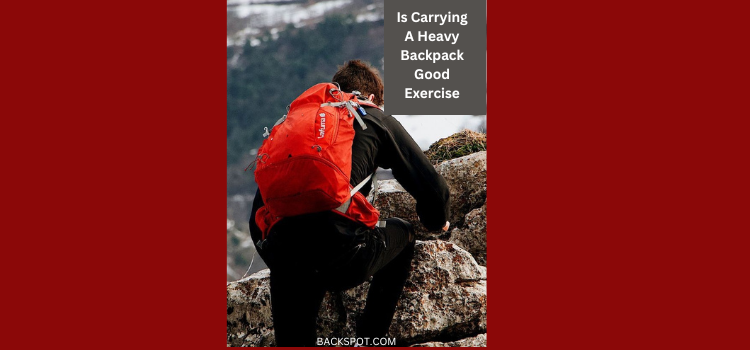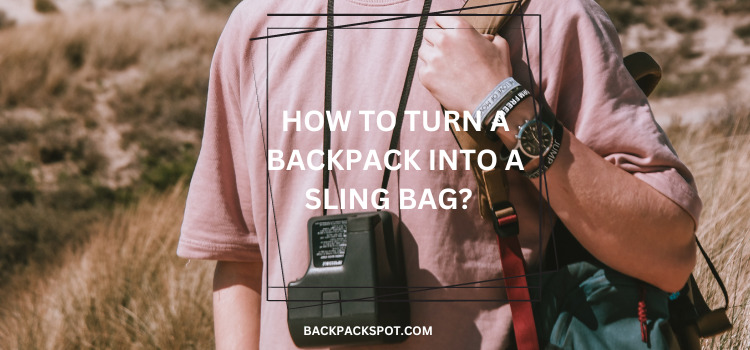Is Carrying A Heavy Backpack Good Exercise? (In-Depth Explanation)
Carrying a heavy backpack is a daily routine for many people, especially students and hikers. But have you ever asked yourself: Is carrying a heavy backpack good exercise? Let’s answer your question!
Absolutely, carrying a heavy backpack is a healthy exercise. It can improve cardiovascular health, strengthen muscles, burn calories, and provide mental health benefits. However, moderation, proper form, and complementing a well-rounded fitness routine are essential.
In this article, we will explore the benefits, potential risks, and overall effectiveness of carrying a heavy backpack as a means of staying fit. We’re ready to dive in now, so let’s begin!
Understanding the Basics
Before we jump into the workout potential of a heavy backpack, let’s first understand what it entails. Carrying a heavy backpack sometimes referred to as “rucking” or “weighted walking,” is essentially the act of walking or hiking with a loaded backpack.
The weight can range from a few pounds to several dozen pounds. This weight places added stress on your body, primarily your back, shoulders, and legs.
Is Carrying A Heavy Backpack Good Exercise?
Yes, carrying a heavy backpack can indeed be a form of exercise that offers various health benefits. When you carry a heavy backpack, you engage various muscle groups that can help to tone and strengthen them. Additionally, carrying a heavy backpack can help improve your posture and increase your endurance.

Backpack-Carrying Muscles
The muscles involved in carrying backpacks are usually the back, shoulders, and legs. These muscles work together to lift the backpack and hold it in place. Let’s
discuss how they work:
Back Muscles
Carrying a heavy backpack engages your back muscles, including the trapezius and rhomboids. These muscles work to stabilize your spine as you balance the load on your shoulders.
Shoulder Muscles
Your shoulders, especially the deltoids and the rotator cuff muscles, come into play when carrying a backpack. They are responsible for maintaining the position of your arms and providing stability.
Leg Muscles
While your legs aren’t directly lifting the weight, they play a crucial role in maintaining balance and supporting your body as you walk with the backpack.
Pros of Carrying a Heavy Backpack
Now that we’ve identified the muscles involved, let’s discuss the potential benefits of this exercise:
Strengthens Core Muscles
The effort required to balance a heavy load on your back engages your core muscles, helping to strengthen your abdominal muscles.
Improves Posture
Carrying a backpack with proper weight distribution encourages good posture. It teaches you to stand upright and avoid slouching.
Cardiovascular Workout
Walking with added weight can significantly increase your heart rate and help improve cardiovascular fitness. It engages the heart and lungs, promoting better circulation and oxygen delivery to your muscles.
Burns Calories
Walking with a weighted backpack can burn more calories compared to regular walking. For people looking to lose weight, this can be particularly helpful.
If you want to learn more about it in detail, then you need to go through What Are Benefits Of Using Backpack? Top 5 Benefits
Cons to Be Aware Of
However, it’s essential to consider the potential drawbacks and risks:
Strain and Injury
Carrying a backpack that’s too heavy or with improper weight distribution can lead to strain and injury, particularly in the back and shoulders.
Uneven Muscle Development
Relying solely on backpack carrying for exercise might lead to uneven muscle development, neglecting other muscle groups.
Not a Complete Workout
While it can be beneficial, carrying a backpack shouldn’t replace a comprehensive exercise routine that includes strength training, flexibility, and cardiovascular workouts.
Effectiveness Compared to Other Exercises
While carrying a heavy backpack can offer several health benefits, it’s essential to consider its effectiveness in comparison to other forms of exercise.
1. Cardiovascular Exercise
Carrying a heavy backpack can provide a cardiovascular workout, but activities like running, cycling, or swimming may offer more efficient and effective cardiovascular benefits.
2. Strength Training
While it can help improve muscle strength, targeted strength training exercises at the gym or with weights may yield faster and more noticeable results.
3. Weight Management
Carrying a backpack can help with weight management, but it’s crucial to combine it with a balanced diet for optimal results.
Tips for Safe Backpack Carrying
To make the most of backpack carrying as an exercise, follow these tips:
Choose the Right Backpack
Opt for a backpack with adjustable straps and proper weight distribution. Make sure it fits you well.
Gradually Increase Weight
Start with a lighter load and gradually increase the weight as you build strength and endurance.
Maintain Good Posture
Pay attention to your posture while carrying the backpack. Maintain a straight back, relaxed shoulders, and even weight.
Take Breaks
If you’re carrying a heavy backpack for an extended period, take breaks to rest your muscles and avoid overexertion.
Consider reading 10 Tips How To Find a Quality Backpack. (Ultimate Guide)
Conclusion
So, is carrying a heavy backpack good exercise? The answer is yes but with some caveats. It engages different muscle groups, improves posture, and even works your cardiovascular system. The technique should be mindfully applied with proper weight distribution. For best results, complement backpack carrying with a well-rounded fitness routine!
FAQs
Q: How heavy should the backpack be for effective exercise?
A: The ideal weight varies from person to person. It’s crucial to choose a weight that challenges you without causing strain or discomfort.
Q: Are there age restrictions for backpack exercise?
A: Backpack exercise can be suitable for individuals of various ages, but older adults and children should use lighter loads and exercise with caution.
Q: Can carrying a heavy backpack cause long-term damage to my spine?
A: Prolonged or excessive use of heavy backpacks can potentially lead to spine-related issues. It’s essential to use proper techniques and consult with a healthcare professional if you have concerns.
References
https://backpackbuff.com/does-carrying-a-heavy-backpack-build-muscle/
https://backpacks.global/does-carrying-a-heavy-backpack-build-muscle/
https://backpackjoy.com/does-carrying-a-heavy-backpack-build-muscle/






